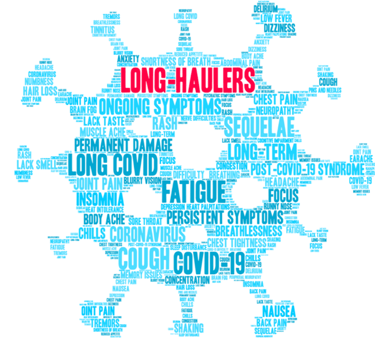
Emerging evidence and patient testimony suggests a growing number of people who contract COVID-19 cannot shake off the effects of the virus months after initially falling ill. Symptoms are wide-ranging and fluctuating, and can include breathlessness, chronic fatigue, “brain fog,” anxiety and stress.
In October 2020, the National Institute for Health and Care Excellence in the UK defined post-COVID syndrome as signs and symptoms that develop during or following an infection consistent with COVID-19 that continue for more than 12 weeks and are not explained by an alternative diagnosis. The definition says the condition usually presents with clusters of symptoms, often overlapping, which may change over time and can affect any system within the body. It also notes that many people with post-COVID syndrome can also experience generalised pain, fatigue, persisting high temperature and psychiatric problems.
The likelihood of developing post-COVID-19 syndrome is not thought to be linked to the severity of a person’s acute COVID-19 (including whether they were in the hospital).
The exact number of people experiencing post-COVID-19 syndrome, sometimes called “Long COVID,” is unclear. An estimated 60,000 people in the UK are currently thought to be experiencing it, although this is likely to be higher and to grow as coronavirus infection rates rise. In a survey by the UK Government’s Office for National Statistics in November 2020, around one in five people who tested positive for COVID-19 had symptoms that lasted for five weeks or longer, and one in 10 people had symptoms that lasted for 12 weeks or longer.
Symptoms
The most commonly reported long-term symptoms include fatigue, shortness of breath, cough, joint pain and chest pain. Other reported long-term symptoms include difficulty with thinking and concentration (“brain fog”), depression, muscle pain, headache, intermittent fever and heart palpitations. More serious long-term complications appear to be less common but have been reported, including:
- Inflammation of the heart muscle.
- Lung function abnormalities.
- Acute kidney injury.
- Skin rash, hair loss.
- Smell and taste problems, sleep issues, memory problems.
- Anxiety, changes in mood.
A recent study of 238 patients hospitalized with COVID-19 in Northern Italy found that four months after they left the hospital:
- 6% had diffusing lung capacity for carbon monoxide that was reduced to less than 80%, based on pulmonary function tests (PFTs).
- 5% had diffusing lung capacity for carbon monoxide that was reduced to less than 60%, based on PFTs.
- 3% had limited mobility based on short physical performance battery (SPPB) assessments, which included evaluating balance in a standing position, walking speed for four meters and standing up from a chair with five repetitions.
- 2% had clinically relevant post-traumatic stress symptoms.
One person– a 37-year-old dedicated runner – told The Guardian she had a cough for three months after contracting COVID-19. It turned into a chest wheeze, breathlessness and intermittent stomach pains, followed by severe muscle pain six months later, as well as dizziness, weak legs and back pain. Another said, “It’s like having jet lag and a hangover. It feels like I’ve been poisoned.”
Management and Care
Research into the causes, symptoms and treatment of post-COVID-19 syndrome is ongoing. NHS England launched “long COVID” clinics, providing assessment for adults, children and young people alike.
In December 2020, the National Institute for Health and Care Excellence (NICE) in partnership with the Scottish Intercollegiate Guidelines Network and the Royal College of General Practitioners published guidelines for clinicians on managing the long-term effects of COVID-19. The guidelines also make recommendations for clinical investigations of patients presenting with new or ongoing symptoms four weeks or later after acute infection. The recommended investigations include a full blood count, kidney and liver function tests, a C-reactive protein test, and an exercise tolerance test (recording level of breathlessness, heart rate, and O2 saturation). They also recommend that a chest x-ray be offered to all patients by 12 weeks after acute infection if they have continuing respiratory symptoms.
Sufferers of post-COVID-19 syndrome feel disbelieved, and doctors have had little concrete information to offer them. Many have found online support groups helpful, both for learning more about the condition and sharing their experiences with others. These groups were vital in campaigning for the recognition that long COVID is now getting.



Share Article